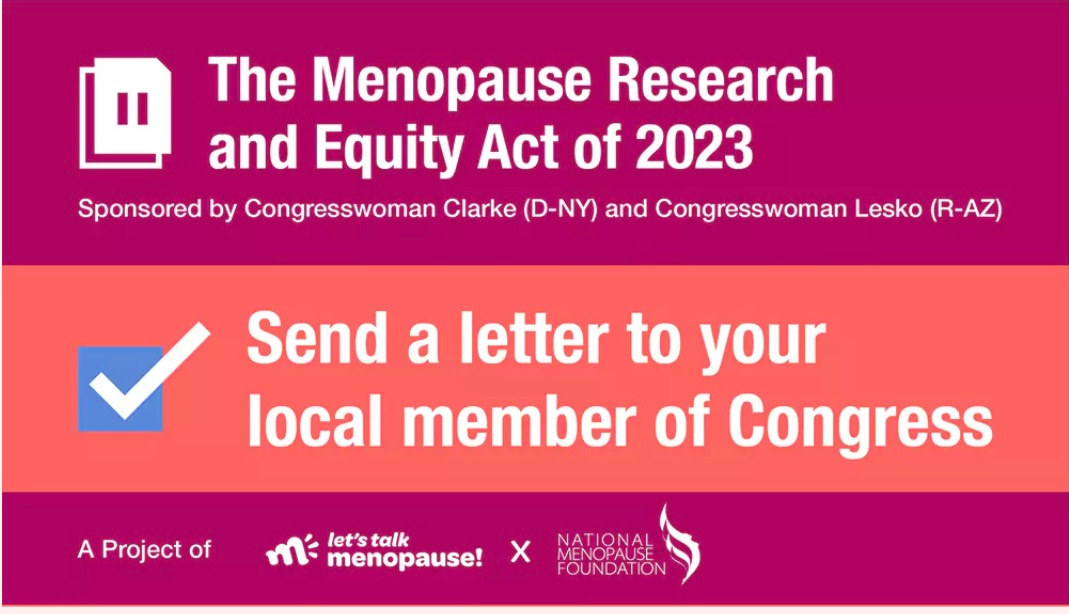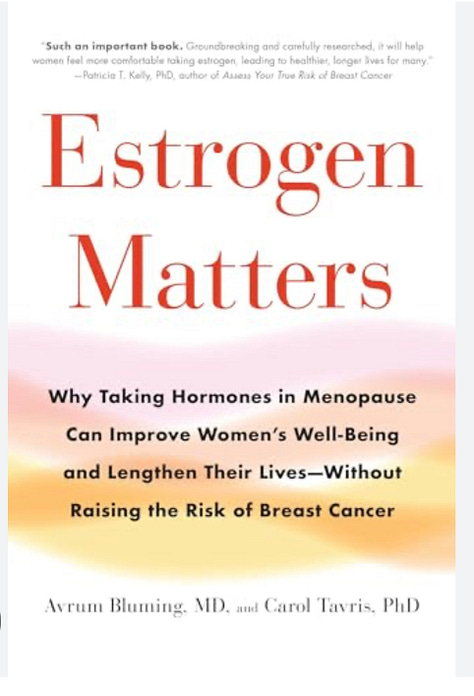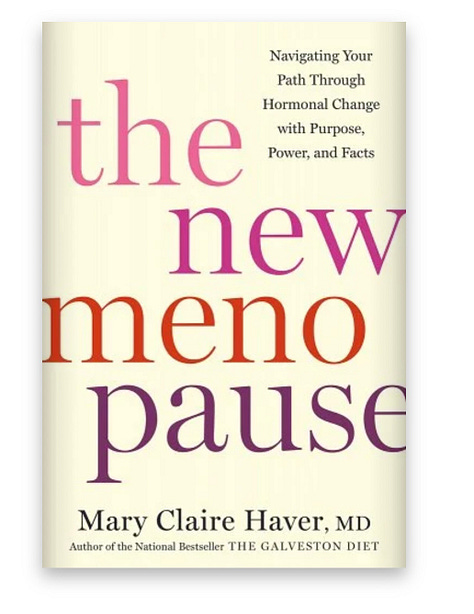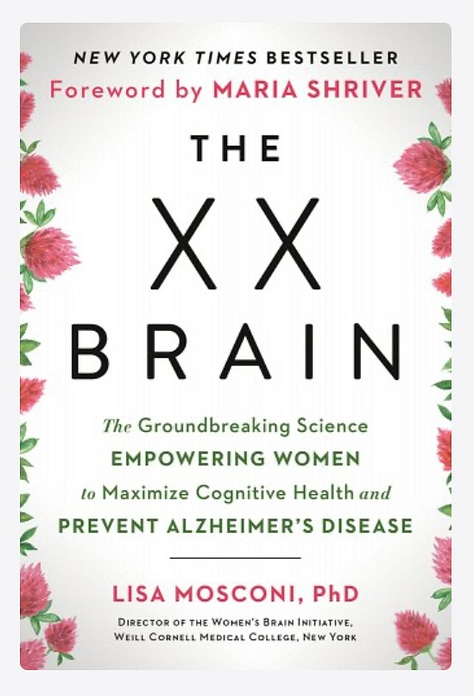Midlife Cheat Sheet: Menopause Edition
Essential resources for the 40+ woman
I’ve been watching the Hulu series “Life and Beth” created by Amy Schumer, and there’s a funny scene (one of many!) where a doctor asks her character Beth if she has any preexisting conditions; she deadpans, “I’m a woman.” I laughed out loud, but sadly, there is a lot of truth in that statement.
Sometime between my early to mid-40’s, I started to feel very off. I was irritable and anxious. I could no longer sleep through the night, and often woke at 3am (like wide awake) feeling like my heart was pounding out of my chest. My once healthy libido had dipped, and I started to have accidents, as in, I would pee myself a little on the regular. My periods became wonky, and as I moved closer to 50, the brain fog set in. Then my whole body seemed to dry out overnight. In short, it was a shit show.
In those early days I had no language for what was happening to me; I thought something was really wrong, which only made me more anxious. Of course I knew menopause would happen someday, but when these symptoms started around age 43, I thought it was still light years away. My gynecologist, a contemporary, essentially told me that “this is just the kind of stuff that happens at this age,” and to jumpstart my libido, she suggested I put on some sexy lingerie to get in the mood. Not helpful.
Unfortunately, my experience was (and is still) not unique. What I didn’t know then is that most doctors have little to no menopause training. Shockingly, only 20% of ob/gyn residency programs provide it as a part of regular curriculum. It’s no surprise that women are not getting the care they need; most docs are working with a very limited tool box and are ill-equipped to have any kind of meaningful discussion about peri/menopause, nutritional and behavioral interventions, or treatments like Menopausal Hormone Therapy (MHT).
The good news is that menopause has made its way out of the shadows in the last several years with the help of some fierce advocates, high profile voices, and a generation of women who are aging out loud and no longer willing tolerate being dismissed. We’ve come a long way, but there’s still much to do to raise awareness, educate, and advocate for funding of critical research into the complexities of women’s health as we age.
And that’s why I created this resource guide/cheat sheet. It’s the type of roadmap I wish I had when I started my peri journey 12 years ago, and I hope it will be a gateway to accessing the information you need to take charge of your health and to consider all of your options as you approach/go through your own peri/menopause journey.
The cheat sheet will link you to organizations, doctors, authors, podcasters, and influencers that are focusing on educating in the peri/menopause space. There’s also a section to connect you to femtech companies that provide virtual menopause care. I’ll start with some quick facts as an overview, and then take you right to the source(s) where you can jump down some pretty well-lit rabbit holes.
I tend to live in my midlife bubble, talking and writing about topics like menopause daily, but every time I venture out of it, I realize that many women have no idea where to even start to get the vital information they need to make well informed health decisions. I am not a doctor (okay, a Juris Doctor, but that doesn’t count here), and none of this should be construed as medical advice. I simply want to share all I have learned (and unlearned) and empower you with information to help you thrive and live your best life.
If you find it helpful please share and hit the ❤️ to help others find us here…
Facts
Some key things to know before diving in, and warning, some of these facts are infuriating.
One-quarter of the US population is a woman over the age of 40.
Perimenopause means “around menopause” and refers to the transitional time leading up to your last period. Hormones start to fluctuate wildly, leading to myriad symptoms (see National Menopause Foundation symptom tracker below). It typically begins in the early to mid 40s and lasts an average of four years, but for some, it can be as long as 10 years.
The average age for onset of menopause (defined as going 12 consecutive months without a period) is 51 years old.
1.3 million women enter menopause each year in the US, and more than 50 million women are currently post-menopausal in this country.
80% of ob/gyn residents say they are ill-prepared to talk about menopause, and there are only 1500 certified menopause physicians in the US.
84% of menopausal women struggle with genital, sexual and urinary discomfort.
Post-menopausal women are at increased risk for cardiovascular disease and osteoporosis and cognitive decline.
Hormone replacement therapy (now known as MHT) was used by approximately 40% of women up until 2002, but when a (seriously flawed) Woman’s Health Initiative (WHI) study linked its usage to an increased risk of breast cancer, that number dropped to around 5%. We now know the risk was overstated for many women, and that the benefits of starting MHT prior to age 60 outweigh the risk for many.
Just a little over 10% of the National Institutes of Health (NIH) budget (which totals $47 billion annually) is allocated to women's health research, despite the fact that women make up half of the population.
Until 1993 there was no requirement that women or minorities be included in NIH clinical trials.
Overview Articles
There are many great articles out there, but these two offer an excellent overview on the incredibly important topics of:
Menopausal Hormone Therapy (Sue Dominus via the NYT)
The current state of affairs regarding research and funding for women’s health. It covers the 2023 White House Initiative on Women’s Health Research as well as the Menopause Research and Equity Act of 2023 that was recently introduced to congress. (Dr. Sharon Malone and Jennifer Weiss-Wolf via The Hill)
Organizations
These nonprofit organizations are a wellspring of information and each provide valuable resources to help you navigate the peri/menopause journey.
Let’s Talk Menopause (@letstalkmenopause): a nonprofit working to change the conversation around menopause “to ensure women get the information they need and the healthcare they deserve.” Here you can search for menopause doctors and access up-to-date articles, menopause talks and podcasts on the topic. You can also participate in menopause advocacy by signing the template letter to your member of congress to support passage of the Menopause Research & Equity Act of 2023.
National Menopause Foundation (@nationalmenopausefoundation): A nonprofit dedicated to creating community, educating, and advancing research and policies promoting women’s health at midlife. Download the menopause symptom checklist to use as a discussion guide when speaking with your health care provider.
The Menopause Society (@menopause_society): Formerly known as The North American Menopause Society or NAMS, this nonprofit educates and certifies physicians in menopause care. Find a certified menopause provider in your area here.

Books
Knowledge is power, and much of the information within these pages has changed my life and the lives of many women I know. I’ve had the good fortune to meet and to hear some of these doctors/authors speak, and they are an incredible group dedicated to educating in the menopause space and to making sure women are empowered to get the care we need to live optimally as we age.
The New Menopause by Mary Claire Haver, MD
How to Menopause by Tamsen Fadal
Dare I Say It: Everything I Wish I’d Known About Menopause by Naomi Watts
The Menopause Brain by Lisa Mosconi, PhD
The XX Brain by Lisa Mosconi, PhD
Grown Women Talk by Sharon Malone, MD
Estrogen Matters by Avrum Bluming, MD and Carol Tavris, PhD
Menopause Boot Camp by Suzanne Gilberg-Lenz, MD
You Are Not Broken by Kelly Casperson, MD
The Hormone Shift by Tasneem Bhatia, MD
Hot and Bothered by Jancee Dunn
The Menopause Manifesto by Jen Gunter, MD
Second Spring by Kate Codrington
The Complete Guide to Menopause by Annice Mukherjee, MD
The Natural Menopause Method by Karen Newby
Menopocayplse by Amanda Thebe
The Wisdom of Menopause (4th edition- an OG!) by Christiane Northrup, MD



So much good information out there, if you know where to look...
Podcasts
Lots of great listening for that daily walk, commute, laundry day, etc. Some of these are peri/meno specific and others are more broadly midlife-centered, touching meno as well as many of the topics that impact us as we move into midlife and beyond. All can be found wherever you listen to pods…
You Are Not Broken with Kelly Casperson, MD
Health by Heather Hirsch, MD
A Certain Age with Katie Fogerty
The Flexible Neurotic with Sarah Milken
Black Girl’s Guide to Surviving Menopause with Omisade Burney-Scott
Hello Menopause with Christine Maginnis and Robin Gelfenbien
Hot Flashes and Cool Topics with Bridgett Biagi Garratt and Colleen Rosenblum
The Hormone Solution with Karen Martel
Dr. Streicher’s Inside Information: THE Menopause Podcast with Lauren Streicher, MD
Everything is Fine with Kim France and Jennifer Romolini
The Jen Marples Show
Doctors, Advocates and Influencers to Follow
A case of social media as a force for good, these doctors, advocates and menopause influencers are showing up on the gram and sharing the goods…
The Swell (a midlife community that is doing some incredible educational programming both live and virtually)
Virtual Menopause Care
These femtech companies are making menopause care more accessible than ever before. Some provide one-on-one telehealth services, while others offer free menopause assessments which allows them to recommend the best treatment options for your symptoms. Some come with app based menopause support and coaching, provide educational resources, and allow for connection with other community members. Insurance widely accepted.
Interlude (specializing in vaginal health)
I’ll link this post to the Midlife Cheat Sheets tab, so you can easily access. It will be a work in progress- I’ll add to it as I find new resources, and likewise, I invite you to comment or DM me if there’s something you think should be included. I’m so grateful to have you here- thank you for spending a little time with me each week!
Dina xx




Thanks so much, Christine, and excellent point! SO important that we stick together and continue to shout out loud...!
Hi! I can’t believe I found all of this resources. I am soon to be 42 and I “dried out” so much this year plus as you said something seems off to me. I was thinking maybe it’s pre menopause but I am only 41. Thank you so much for such a big work. I’m saving this and plan to read and learn how to deal with my symptoms because “nice lingerie” doesn’t help either.